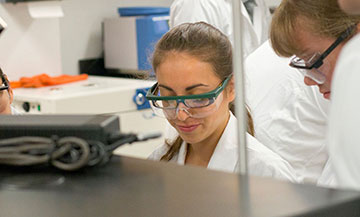The Health Studies concentration is designed to better prepare graduates of undergraduate science programs for entrance into health or medical professional schools and health related employment.
Advance Research and Become an Innovator
Enhance your education and master the field of biology with Nova Southeastern University’s Master of Science in Biological Sciences. This research-focused program offers strategic, hands-on learning and develops the critical thinking skills required for careers in biology. Your program culminates with a novel and significant piece of writing that communicates your scientific findings to the community at large.
NSU’s M.S. in Biological Sciences students benefit from working alongside faculty who are experts in the field of biological sciences. Faculty research includes areas such as parasite ecology, pathogen and invasion biology, conservation genetics and ecology, biophysical computer modeling, primate and nonhuman primate genetics, antibiotic resistance, and novel antimicrobials.
Choose Your Path
The M.S. in Biological Sciences program offers two paths for the degree: the thesis path or the capstone path. Students are automatically accepted into the capstone path. If the thesis path interests you, additional research proposal development is required.
Concentrations for the M.S. in Biological Sciences are also available. Whether you're interested in biology, health studies, or bioinformatics, this program will provide you with the tools and the knowledge to be a caring and skilled professional.
Health Studies Concentration


Bioinformatics Concentration
The Bioinformatics concentration heavily emphasizes computation, line command coding, and programming as it applies to biological problems and questions preparing you for successful employment in the broad field of computational biology.
Quick Facts
Shark Sightings
Every student has a story. The “Shark Sightings” video series highlights undergraduates, graduate students, and NSU alumni who are diving into their coursework, getting involved in extracurriculars, and using their education to make a difference in their chosen fields.
Learn why each Shark says they chose NSU, and how their degree is preparing them to dominate.
Career Outcomes
Biological Sciences Curriculum
In addition to the requirements, students can choose from any of the electives listed, as well as, those listed in the M.S. in Marine Science program and others at the department's discretion. For specific course requirements, refer to the “M.S. in Biological Sciences Program" in NSU's Halmos College of Arts and Sciences Graduate Student catalog.
The academic program and curriculum requirements listed on this page are from the NSU Halmos College of Arts & Sciences Graduate Student Catalog. Students are bound by policies and curricula published in the catalog in effect the semester they enter the university unless an agreement is made with appropriate NSU administration officials allowing them to abide by policies published in a later catalog.
Prerequisite Coursework
- Biology: Two semesters (or equivalent) with lab
- Biostatistics or Applied Statistics: One semester (or equivalent)
- General Chemistry: One semester (or equivalent) with lab
- Mathematics (college level): One semester (or equivalent)
- Upper-Level Science: One additional semester (or equivalent)*
Admissions Requirements
-
NSU Graduate Application
-
Baccalaureate degree from an accredited academic institution
-
Official Transcripts from all educational institutions attended since high school
- Identification of area of research interest and potential faculty mentors
-
Minimum cumulative GPA to be considered for admission: 3.0
- Submit a 'Resume' OR 'Curriculum Vita'
Graduate Open House
Join us on Tuesday, October 14 at 12:30 p.m. EST to learn more about Biological Sciences, including careers within the field, NSU graduate degree offerings, and the application process.
This event is free and open for all to attend. You may register for the Open House HERE.
Program directors and department faculty from the Department of Biological Sciences and NSU Halmos College of Arts and Sciences Graduate Admissions will be in attendance to answer your questions about your program(s) of interest.




